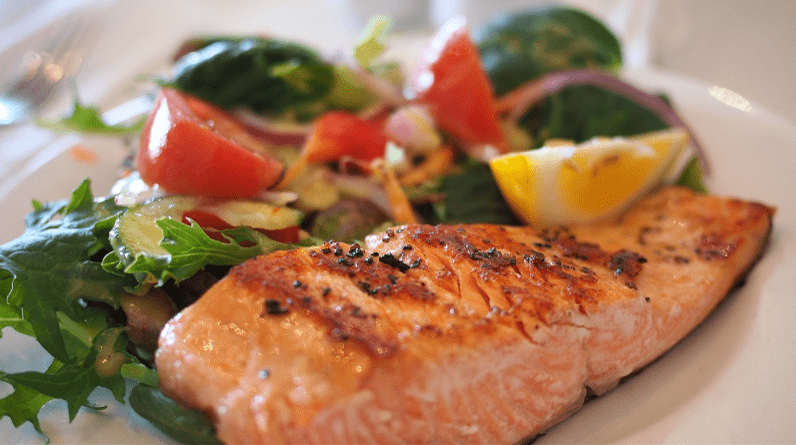
Understanding The Low-Carb Diet
If you’ve recently decided to start a new diet and lose weight, then you’re probably considering one of the many low-carb diets that have become very popular in recent years.
The low-carb diet is a nutrition plan that restricts the intake of carbohydrates to 20-40 grams per day or less. There are various variations of the low-carb diet, with different recommendations on what type of carbs should be avoided and which can be eaten in smaller quantities.
There are many benefits of this particular diet, including improved insulin sensitivity, blood lipid profile, and an increase in lean body mass. But what exactly is the low-carb diet? Is it safe to follow? And how do you start? Keep reading to find out!
What Is a Low-Carb Diet?
A low-carb diet is a nutritional plan that restricts the intake of carbohydrates to 20 grams per day or less. A low-carb diet is often used to promote weight loss and improve health by following a high-fat, low-carb diet is usually high in protein and fats, and low in carbs.
A typical low-carb diet consists of 70% fat, 20% protein, and 10% carbs. Many people who follow a low-carb diet replace the carbohydrates they are no longer consuming with more plant-based proteins, healthy fats, and fiber-rich vegetables.
How Does the Low-Carb Diet Work?
A low-carb diet is based on the principle that when the body doesn’t have enough carbs to fuel it, it burns stored fat instead. This leads to a state called ketosis, in which the body breaks down stored fat into ketones, which can be used as energy.
A low-carb diet works by limiting your daily carbohydrate intake. While most people consume about 45% of their calories from carbohydrates, a low-carb dieter consumes about 10% or less.
Remember, it’s a low-carb, high-fat diet. That means that the majority of your caloric intake will come from fat, with a moderate amount coming from protein and very little coming from carbs.
When you consume fewer carbs, your body is forced to use fat for energy, which leads to weight loss. When following a low-carb diet, your body enters ketosis, so you can burn fat for energy instead of glucose.
When you’re in this metabolic state, your liver converts fatty acids into ketones, which can be used as fuel by your muscles and brain. When you’re in ketosis, you are less hungry and, therefore, less likely to overeat.
That’s because when you eat a lot of carbs, your body breaks them down into glucose, which is then used for energy. When you restrict your carbs, your body uses stored fat for energy instead. This can lead to weight loss and other health benefits, such as lower blood sugar and blood pressure levels.
A low-carb diet can also help you feel fuller longer because protein and fat are more filling than carbs. This can help you eat less overall and lose weight.
Advantages of a Low-Carb Diet
The low-carb diet might provide health benefits because of its ability to lower blood sugar and insulin levels and promote weight loss.
Some studies have found that eating a low-carb diet can improve insulin sensitivity, blood lipid profile, and increase in lean body mass. These benefits can help prevent or manage chronic diseases, like type-2 diabetes and heart disease.
The low-carb diet can be beneficial for weight loss, particularly when paired with exercise. Studies have shown that low-carb diets are as effective as other types of diets for weight loss, and they have fewer long-term health risks.
- Improved insulin sensitivity – When you regularly eat a low-carb diet, you reduce the intake of carbohydrates in your body, which leads to reduced insulin levels. This is especially beneficial for people with type 2 diabetes, as insulin is needed to lower blood glucose levels.
- Blood lipid profile – A low-carb diet can significantly lower your LDL cholesterol, or the bad cholesterol in your blood, and can increase your HDL, or your good cholesterol.
- Weight Loss – The keto diet can help you lose weight because it causes your body to burn more fat. When you eat a lot of carbs, your body stores the excess carbs as glycogen in the liver. Your liver can only store so much glycogen, so when you eat more carbs than your body needs, the excess carbs are stored as fat.
Disadvantages of a Low-Carb Diet
There is some controversy surrounding low-carb diets, and not all experts agree that they are safe or healthy. Some people may experience negative side effects, such as constipation, bad breath, and headaches when following a low-carb diet.
Additionally, people with diabetes or who are on medication for diabetes should speak with a doctor before starting a low-carb diet, as it may not be safe for them.
These problems can often be resolved by adjusting your diet and taking supplements, such as vitamins B12, folic acid, or iron.
The low-carb diet may pose health risks for certain people, such as those who are pregnant or breastfeeding, people with kidney disease, people with diabetes, or people with gastrointestinal problems.
A low-carb diet may also not be appropriate for children or athletes who need more carbohydrates for energy and growth.
How to Start a Low-Carb Diet?
When following a low-carb diet, it’s important to understand that there are multiple variations of this diet. Depending on which plan you follow, your carb intake can vary from 20 grams to 100 grams per day.
Some low-carb diets, like the Atkins diet, recommend that you follow a high-protein, low-carb diet in order to promote rapid weight loss. Other low-carb diets, like the South Beach diet, recommend that you follow a moderate-protein, low-carb diet in order to promote long-term weight loss.
While these diets have some differences, they also have many similarities, including:
- Eating mostly unprocessed foods
- Limiting the intake of sugar and refined carbohydrate
- Eating more vegetables and healthy fats.
Final Words: Is the Low-Carb Diet for You?
A low-carb diet is a great option for those who want to lose weight. It can be a healthy, nutritious way of eating, as long as you are careful to meet your daily nutritional needs. Before deciding to follow any diet, it’s important to understand the risks and benefits. If you’re at risk for certain diseases, it’s important to consult with a medical professional before starting a new diet.

